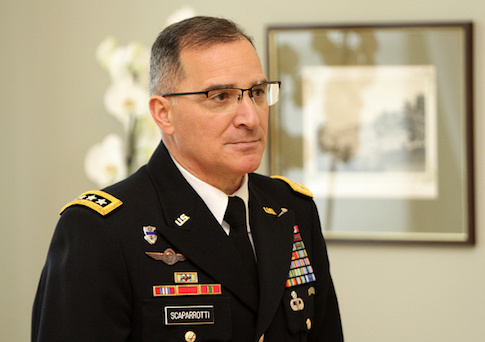Russia is waging a malign information warfare campaign to undermine the United States and its allies, the general in charge of the European Command told Congress on Thursday.
Army Gen. Curtis Scaparrotti, who is also NATO's supreme allied commander, told a Senate hearing the U.S. government needs a strategy and system to counter Russian information attacks.
In testimony before the Senate Armed Services Committee, Scaparrotti said the United States needs to respond to Russia's deployment of a cruise missile that violates a 1987 treaty banning intermediate-range nuclear missiles.
The four-star commander also testified that NATO must continue to deploy nuclear weapons in Europe in the face of new Russian nuclear threats, including Moscow's new strategy to more easily use nuclear arms in any future conflict.
On Russia's propaganda and disinformation activities, he said Moscow recently set up a new information warfare division within its military.
"The Russians see this as part of that spectrum of warfare, it's their asymmetric approach," Scaparrotti said.
"We have information operations that are military and I have those that are countering malign influence in Europe. But what we really need is we need a whole of government approach, a whole of government information campaign of which I am a small part of that."
During the Cold War, the United States operated the U.S. Information Agency and several official and semi-official radio stations. USIA was disbanded in 1999, and U.S. radio programs are poorly led and funded.
"We need somebody to lead that and then we need to finance it and form a governmental strategy," Scaparrotti said.
NATO and the European Command set up the Russian Information Group to counter Russian information warfare. But the group needs to be reinforced, financed, and provided with authority that will allow it to be effective, he said.
Russia is conducting political influence operations throughout Europe with the goal of bolstering pro-Russian sentiment throughout the continent.
Moscow also is using its information warfare capabilities—intelligence services and state-controlled media outlets—to target perceived enemies.
The FBI, CIA, and National Security Agency, in a report made public in January, identified what the agencies described as a Russian government cyber-enabled influence operation involving the FSB and GRU military intelligence services to hack Democratic and Republican institutions and provide the information to Russian propaganda outlets, including the anti-secrecy website WikiLeaks.
Scaparrotti said Russia is using similar tactics against European governments in a bid to influence internal politics and create disunity and foster weakness.
Russian military forces engaged in an effective campaign of deception and disinformation during the 2014 takeover of Ukraine's Crimea and subsequent support of pro-Russian rebels in eastern Ukraine.
Scaparrotti said in addition to military information warfare forces, Moscow is using intelligence services and propaganda and social media outlets.
"Russia actually has a very broad set of groups to include their intelligence groups that are doing this," he said. "So they actually have a whole of government approach on this."
Asked about the violation of the Intermediate-Range Nuclear Forces Treaty by Russia, Scaparrotti said Russia's cruise missile gives its military a significant capability.
Russia recently began deploying a new ground-launched cruise missile, the SSC-8, in violation of the INF treaty.
"This deployment gives them some advantage in terms of reach and precision within their systems and when we talk about escalation management if there is a tension or a crisis with Russia because of their doctrine and their view that they will escalate to dominate or escalate to deescalate, it creates a very tight range of options when we work through escalation management," he said.
The Pentagon is considering several options to counter the new missile, including new missile defenses and the deployment of intermediate-range cruise missiles.
Scaparrotti declined to discuss his preferred response during the open hearing.
In his opening remarks, Scaparrotti focused much of his testimony on the growing threat posed by Russia's conventional and nuclear forces.
The European Command is shifting its posture from cooperating and engaging Russia to deterring and defending against Russia.
"In short, we are returning to the historic role as a war fighting command focused on deterrence and defense," he said.
To counter Russian aggression the command is bolstering relations with allies and partners in Europe, including the Baltic nations, Poland, Turkey, and Ukraine.
U.S. military forces in Europe must be modernized in order not to fall behind adversaries. Priority upgrades are needed for intelligence and surveillance, land forces to deter Russia, naval forces including anti-submarine warfare forces, strike forces, and amphibious warfare capabilities.
Committee Chairman Sen. John McCain (R., Ariz.) said in opening remarks that the Russian annexation of Crimea three years ago last week revealed a danger that had been obvious for years.
"The United States and our European allies confront an aggressive, militarily capable Russian government that is hostile to our interests and our values, and willing to use force not as a last resort, but as a primary tool to achieve its revisionist objectives," McCain said.
The United States has not adjusted to the new strategic reality in Europe.
"We continue to lack coherent policy and strategy to deter conflict and prevent aggression in Europe," he said.
"Despite important progress made through the European Deterrence Initiative, we still have no long-term vision for U.S. force posture in Europe, one that accounts for Russia’s rapid military modernization, evolving nuclear doctrine, violations of the INF Treaty, advanced anti-access/area denial threat concentrated in Kaliningrad, and significant military buildup along its western border."
